Self Harm – Reasons and First Aid
- Parita Sharma

- Aug 22, 2025
- 6 min read
Self Harm – Reasons We Don’t Always Understand
Sometimes it’s a cry for help. Sometimes it’s a way to control. But no matter the reason, self harm is never just about the wound. It’s about what’s going on inside.
People who harm themselves are often not trying to end their lives. They’re trying to survive. For some, it’s the only way they feel heard. For others, it’s a desperate attempt to control their environment — their relationships, their pain, or their own emotions.
One of the hardest things I hear in therapy is:
“If I don’t do what they say, they’ll harm themselves.”
This creates deep confusion for the person witnessing it. Is it blackmail? Is it genuine suffering? Should I give in? Should I walk away?
Let’s talk honestly.
The Two Faces of Self Harm: Manipulation or Cry for Help?
When someone threatens to hurt themselves to get something from you — whether it’s attention, love, obedience, or guilt — this is manipulation. But it still comes from a deeply unstable mental state. This is not normal behavior. It needs professional help.
When someone harms themselves in silence or after repeated emotional pain, it’s often a cry for help. In both cases, the root cause is emotional dysregulation — the inability to process and manage distress in healthy ways.
The person may feel invisible. Powerless. Desperate to feel something, or anything.
But guilt-tripping someone into compliance or relief is not healing. It’s control. And it’s not your job to carry that burden alone.

What Counts as Self Harm?
We often imagine self harm as cutting, hitting, burning, or overdosing. And yes — these are serious, visible forms of harm.
But emotional self-harm is just as real.
Saying “I’m worthless” repeatedly
Believing “I deserve the pain”
Starving yourself
Staying in abusive relationships to punish yourself
Destroying things you care about — jobs, friendships, love
Verbally abusing yourself out loud or in your mind
These are acts too. Just not with a blade.
Whether it’s physical or verbal, self harm is always rooted in one thing: emotional pain that has no outlet.
Why People Harm Themselves
At its core, self harm is about control.
Control over others – “If you don’t listen to me, I’ll hurt myself.”
Control over chaos – “When life feels messy, I can at least control the pain.”
Control over numbness – “If I feel pain, at least I feel something.”
Sometimes it’s manipulation — used to make others obey, guilt-trip, or surrender.
Sometimes it’s despair — used as a last resort when words fail.
In both cases, it’s not healthy. And it’s not okay.
If You’re the One Hurting
If your pain is so loud you need to scream it — through cuts, through words, through silence — know this:
You are not bad.You are not weak.But you are hurting.
And it’s time to stop doing it alone.There are healthier ways. Safer ways. More loving ways.
Self Harm Is Not the Solution — But a Sign
A sign that something is not okay inside.A sign that emotional regulation has broken down.A sign that now, more than ever, support is not optional. It’s essential.
Whether the harm is visible or whispered…Whether it’s to control, cry, or cope…
Self harm needs professional attention. And you — or your loved one — deserve more than just temporary relief.
If You're the One Witnessing It
You might be:
A partner whose every “no” becomes a threat.
A parent walking on eggshells.
A friend receiving late-night texts saying “I’ll hurt myself if…”
It’s terrifying. Know that you are not GOD, it's not your job to fix things you are not trained for and you have limitations too. However, introspect and see if you can change your behaviour, but not at the cost of manipulation and your own sanity. Know the difference of surrendering to threat or complying in the relationship.
Here’s what I want you to know and recite it or write daily till you get it:
"I will not negotiate with emotional threats".
"I not responsible for someone else's actions".
"I am responsible for what I said, not what they interpret".
"My job is to take them to the professionals, not fix or surrender".
"If I cannot draw healthy boundaries, I must seek help with the professional".
"I am not their therapist, I am not trained to handle such an emotional disturbances".
Most importantly — take care of yourself, that is the only control you have in this situation. You may stop them from immediate harm for a while, but not help them forever. Being emotionally blackmailed or witnessing harm can be traumatic. You matter too. Please call a mental health professional, a crisis line, or take them to emergency care. Even if it feels like “drama,” take it seriously. But don’t enable the cycle by surrendering to it.
Steps
1st. Stop immediate threat by doing whatever is needed to protect harm. (Protect self and other in the best of your capacity)
2nd. Immediately - on PRIORITY, call or take them to the emergency for further help.
3rd. Take care of your self get in touch with professionals, learn mental health first aid, you will need to learn how to deal with this too.
They don’t need you to say yes. They need someone to say — you need help gently with empathy, "I am here with you, not for you".
Constantly saying yes — out of fear or pressure — doesn’t actually help them heal. It only feeds the cycle of emotional instability and unhealthy dependence.
“They need someone to say — you need help”
This is a redirection. Instead of giving in, it urges us to gently but firmly say: “You are hurting and this is beyond what I can handle alone.” It validates their pain without validating their control tactics.
It’s a call for professional intervention. You’re not denying their suffering — you’re pointing them to the right door.
“I am here with you, not for you.”
This is the key boundary.
“With you” means you care. You’ll walk alongside them. You’ll support them.
“Not for you” means you won’t take responsibility for their choices, or become the sole reason they feel okay.
You are not their savior. You're not the therapist. You’re a companion — not the cure.
Why this matters:
Many people dealing with loved ones who self-harm feel trapped between two painful options:
Abandon them and feel guilty
Obey them and lose themselves
Let us offer a third way: Stay kind. Stay present. But don’t lose your own mental health in the process.
The only help you can offer is take them to emergency or mental health professional. The only help you can offer, surrendering to their demands or threats will only increase the illness not cure it.
First Aid - Real Help is Professional Help
Whether it’s manipulation or pain, self harm is a sign that something inside is not okay. And no amount of reassurance or sacrifice from loved ones can replace proper care.
Therapy teaches emotional regulation. It offers tools, not guilt. Healing, not threat. Boundaries, not fear.
If someone is self harming, take them to a therapist or emergency facility immediately. And if you’re the one constantly threatened, seek therapy for yourself too. You deserve peace.
Note to Those Struggling in Silence
If you’re reading this and hurting yourself quietly —You’re not alone. But pain doesn’t have to scream through wounds. There are ways to feel again. Safely. Fully. Freely. Don't mistake love to contain your emotional baggage. Your emotions are your responsibility, not your loved ones, it's your baggage that you need to carry and learn to unpack before your relations dies under the unknown weight.
And if you’re the one watching someone spiral —You’re not heartless for setting boundaries. You’re not cruel for protecting yourself. You’re brave for calling it what it is: a sign of help needed, not help to be given by you alone.
Healing starts with clarity.
If this touched you, or you’re navigating a situation like this —Let’s talk with a Therapist who is Cultural sensitive, emotionally grounded. In person or online.
Book a therapy session at www.sevee.care Online support
WhatsApp for Ahmedabad appointments: +91 9712777330 Offline support
Click here to understand - is it my fault or am I just surrendering?
Disclaimer
⚠️ Disclaimer
This post is meant for awareness and education only. SEVEE CARE PVT LTD or Parita Sharma does not take responsibility for individual actions or crisis situations. If you or someone you know is threatening self-harm, please seek immediate help from emergency care or a licensed professional.
We strongly encourage you to consult a qualified therapist, lawyer, or designated government authority — especially if you are experiencing physical, mental, or emotional abuse. Your safety and clarity come first.
Threatening self-harm is not a solution. It is a sign that help is urgently needed — not from guilt, but from guidance.








Comments